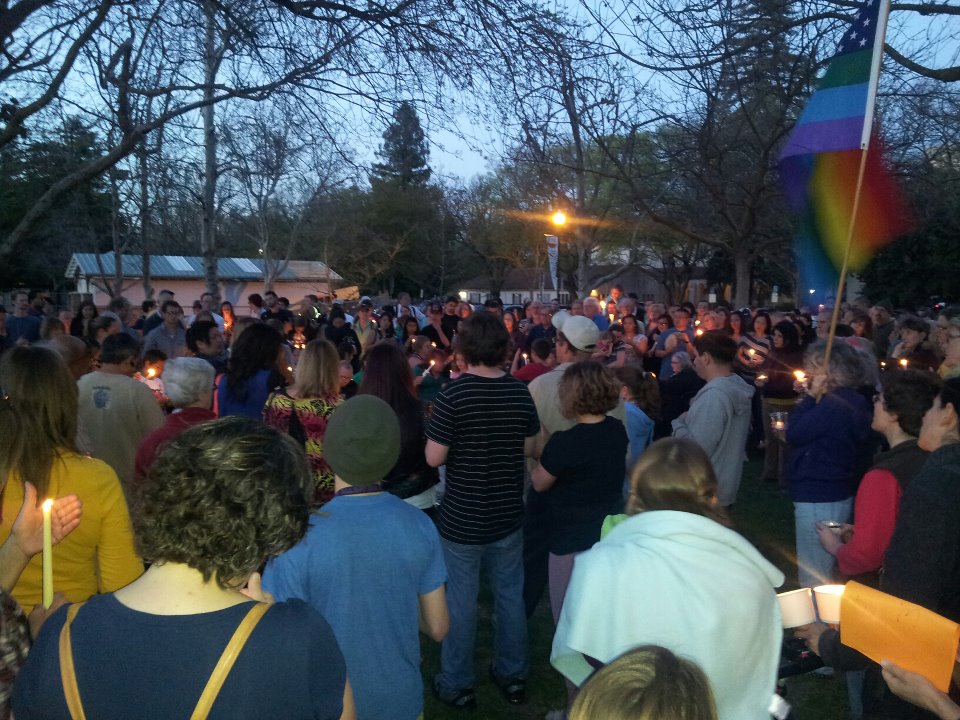 By Robb Davis
By Robb Davis
There has been much speculation about the factors that might lead someone to commit the kind of crime that was perpetrated against Mikey Partida. While some of it may be premature it is a normal human response to try to make sense of something that is so senseless.
Certainly, much more will be learned about the event, the things that led up to it, the story of the perpetrator (whoever it turns out to be), and the likely outcome of a conviction, as the legal process moves forward. We also know with certainty that Mr. Partida will need to go through a painful process of physical and psychological healing. Some scars – physical and psychological – may never fully heal. In quotes from Mr. Partida we have already learned of his fears and anxiety about moving around his hometown. Physical healing is only the first of many long steps he will have to take.
Lisa Rea, founder of Restorative Justice International, who has worked in restorative justice since 1992 believes that victims of crime do not want some vague sense of “closure” but rather they want to regain a sense of safety, security and healing. She argues in a 2012 article[1] that for many victims the healing process would be facilitated by an opportunity to face the offender, ask him/her questions, describe the harm that was done, and seek a way for the harms done to them to be made right. She notes: “…(T)hroughout my work the number of victims who are seeking to participate in some kind of restorative justice dialogue is increasing.”
Unfortunately, as Ms. Rea also notes, our criminal justice system does not make it easy for victims who desire this kind of mediated process to obtain it. There are many reasons for this but two seem to predominate: First, our criminal justice system defines crime as committed against the state-not first and foremost against individuals and communities (pause for a moment and ask how the crime against Mr. Partida has negatively affected our community). The offender, if convicted, is punished by the state and on the state’s terms – the debt is owed to the state first and foremost. This is demonstrated colloquially in phrases like “he paid (or must pay) his dues to society.”
Where is the victim in all of this? Generally victims are left out of most of the process, and this is related to the second reason why victims cannot obtain access to a restorative process even if they desire it. Ms. Rea says that many victims have expressed that “they feel used by the system, like they are just pawns in its game to convict and sentence the offender.” District attorneys, generally speaking, “control” the victim’s narrative. The victim is “theirs” and they may need the victim (and/or the victim’s family) to play a certain role in order to assure that a conviction is achieved. To say that DAs seek to control the victim’s narrative does not imply wrongdoing on their part. As noted, they are part of a system that views crime as something committed against the statutes of the state. They do what they must to find relief for the state.
But this reality should raise the question: does this system provide what victims need? Does the current system provide an opportunity for them to find healing? Does it enable them to have their most burning questions answered? Questions like “What were you thinking?” Why did you hurt me this way?” “Do you know what all of this has meant to me?” “Can you acknowledge the harm you have caused?” What are you going to do to make things right to me?”
I have no way of knowing whether Mr. Partida would like to have an opportunity to ask these questions or not. He may never want the opportunity. Or, he may not want it in the next 6 months. But what if he did? What if, as part of his healing, he desired to meet the perpetrator? Would our system allow him to do so? The answer is probably not.
According to Ms. Rea, restorative justice “puts the crime victim in the center of the system while stressing offender accountability to restore victims and communities as much as possible after crimes are committed.” There are some key points here: victim at center, offender accountability, restoration – or making things right – as much as possible.
What is the downside to creating or evolving a system of justice that encourages offenders to take accountability? What is the downside of giving victims an opportunity – should they so desire – to face their offenders? What is the downside of allowing victim and offender to work out an agreement about what would make the harms right (even if the offender faces other punishments from the state)?
Will the perpetrator in this case, when all is said and done, be confronted by the fact that he committed a crime against a human being and not a “category?” Will he be given a chance to learn of how his crime affected an entire family, place of work and community? Will our system ever provide an opportunity to bring these things to his attention? Or will we merely warehouse him in a prison where he will pay a vague debt to a disembodied state? I believe we should wrestle with all the foregoing questions.
Much more needs to be said about restorative processes and their role in preventing the formation of a “school to prison” pipeline. Some of this was discussed in a Vanguard article on February 4, 2012. Hopefully our community will have a chance to discuss these issues in more detail in the months ahead.
I want to close this reflection by apologizing to Mr. Partida and his family if this article feels like it is pressuring them to seek the kind of victim/offender conferencing suggested here. That is not my intent and I would never advise them to seek this path unless they were convinced it would help Mr. Partida. The intent here is to ask whether restorative processes should be in place – even for violent crimes like this one – in case the victims desire to use them.
I wish Mr. Partida and his family all the best and hope they have all felt the love and support of this community. My thoughts also go out to the perpetrator of this crime. Despite our anger at the heinous act he committed, he remains a human being, albeit one with deep brokenness.





As a victim of a violent mugging by a gang, some forty years ago, I would have been deliriously happy to meet with my attackers, one on one, for some restorative justice . After a year of being threatened by their family members each time I had to make an appearance for a deposition, hearing or trial, I had to be satisfied with sending the two oldest thugs to the pen for a very few years, where hopefully, they got punked by someone else . I have seen several of the vermin running the streets of Sacramento over the years and never fail to try and run them down with my car, when the opportunity arises ! I would still welcome the opportunity to beat the living hell out of the one that laughed as he smashed my friends glasses into his face and stole his watch and wallet . I went out and bought a lottery ticket on the occasion of another one’s untimely passing . What they did to us has affected us everyday since.
I am currently writing a book about a friend’s murder and in interviewing other survivors, I find that for most, including a number who have faced the murderer under controlled circumstances, the desire for revenge never goes away, even after decades . With respect for the charitable nature of Robb Davis and medwoman, I have severe doubts about any chances for rehabilitation of these defective souls . In my experience, those capable of this kind of violence against another being are irredeemable and would be best warehoused in isolation, to prey on one another .
Biddlin ;>)/
Biddlin: You discount this story?
Meeting Face to Face with Daughter’s Killer ([url]http://davisvanguard.org/index.php?option=com_content&view=article&id=6035:meeting-face-to-face-with-daughters-killer&catid=74:court-watch&Itemid=100[/url])
Aren’t you generalizing a bit too much here, particularly off your own very personal experience?
“What if We Gave Victims of Serious Crimes the Opportunity to Face the Offenders?” I discount nothing, David . As a victim, I relate my experience . As a writer, I relate the experience of the now thirty+ survivors I have interviewed in my research on murder and sociopaths . One of the folks I interviewed was involved with a restorative justice experience, where he met with and ultimately forgave the “repentant” murderer, all with considerable press coverage arranged by the murderer’s attorney, only to discover that the murderer had lied about all the circumstances and played him, several other survivors and the system, successfully getting a substantially reduced sentence, on appeal.
I will not sit on a jury in trials that involve physical violence, because I recognise my “prejudice” in this area, but felt, perhaps unduly, qualified to answer the question posed by the headline .
Biddlin ;>)/
Garzon’s defense attorney is probably already lining up “expert witnesses” who will testify that he is a product of a difficult pregnancy/delivery with a possible organic brain injury/defect, diagnosis of ADHD/autism, etc.., was abused by some adult as a child and was lashing out because of his repressed anger, suffers from PTSD, the bad street drugs made him violent, Partida was coming on to Garzon which triggered flashbacks from childhood abuse and caused him to violently act out, etc… His attorney will also get wind of this restorative justice idea and probably use it to try to get a reduced sentence, or get Garzon a term in an inpatient behavioral health unit in lieu of prison time. Partida will get subtle pressure from the community to go the restorative justice route so everyone not directly involved can feel good about themselves. As a 2-time violent criminal (assuming he is convicted of the Dixon stabbing) if Garzon gets convicted he will do prison time and not county time. Prison time will mean he will probably either have to join the Nortenos for his own safety or he becomes somebody’s bitch, so Garzon will shed alligator tears, make a speech worthy of an Oscar, and beg for forgiveness. My prediction is that there will be no prison time for this guy. There is justice for the masses and then there is justice for those who have a little more resources.
“His attorney will also get wind of this restorative justice idea and probably use it to try to get a reduced sentence”
That’s not really how it would work.
Here’s a better description: NY Times article from January ([url]http://www.nytimes.com/2013/01/06/magazine/can-forgiveness-play-a-role-in-criminal-justice.html?pagewanted=all&_r=0[/url])
Sure in that case the length of the sentence was reduced, but that took everyone working together – attorney, victim family, defendant, prosecutor – I’m not saying it’s impossible, but you would have to go through the process first and if the process yielded that, then so be it.
” possible organic brain injury/defect, “-Quite possibly,however the overwhelming majority of those who have such a defect exhibit no such behaviour .
“was abused by some adult as a child” Very likely .
“suffers from PTSD, ” Very unlikely . Sociopaths lack sufficient empathy for PTSD .
” drugs made him violent,” Possibly aggravated his natural inclinations, to be sure.
” Partida was coming on to Garzon which triggered flashbacks from childhood abuse and caused him to violently act out, “-He was more likely seeking attention, and saw an opportunity by asserting his dominance,with the threat to his narcissistic personality as a rationalisation .
Biddlin ;>)/
biddlin – I get it. This is not a process you would have wanted or one that would have helped you. You have found another way and I am sure that it has been important for being able to move on past the terrible experience you had. All I am suggesting, and there is evidence to support it, is that SOME victims would welcome a chance, at some point, to have a mediated conversation with their offenders. There are numerous examples of this from across the US and the world in some of the most heinous crimes imaginable (including the rape of a young woman by her brother and the Rwandan genocide). My title was carefully chosen–give victims an opportunity. This is not forcing anyone to do anything it is merely an opportunity they can choose. Obviously, and there is sufficient practice by now to demonstrate how it can be done, the “conference” must be carefully planned and victims must be able to stop it at any time. Interesting you use the word “charitable”… I guess it is true. I am trying to be charitable to the victims who desire an opportunity to engage in a process like I am describing.
wesley506 – rest assured, your “nightmare” scenario of a savvy lawyer “using” restorative justice to get a lighter sentence is not about to happen. There is simply no way currently for a victim to obtain the opportunity I describe in this article, and if there were it would be victim initiated. So… you can rest easy. However, I think you misread my article: I acknowledged that the state will still inflict its punishment in violent cases. The only difference is that victims will have a chance to have their needs met in the scenario I suggest we need. I am not sure how or why anyone would pressure a victim to engage in this kind of conferencing so that they could feel better about themselves. If you read the article you will note that this is victim-centered. Not offender-centered. Not community-centered.
I know of no objective study on the efficacy of restorative justice in healing the victims’ wounds or helping them find closure . Can you cite any double blind study of outcomes in a sufficiently populace group of victims, or offenders, for that matter . Until I see such evidence, my skepticism seems well founded .
” You have found another way and I am sure that it has been important for being able to move on past the terrible experience you had.”
You most certainly do not understand . Victims/survivors never move past the experience . It remains attached to their conscious thought daily, for the remainder of their lives . I have [u]never[/u] heard a survivor, no matter how long removed, say that they went a single day without the event and/or loss of a loved one causing them grief and bitterness, even the few who forgive the offender .
biddlin – Two things:
1. I clearly failed utterly in my attempt to relate to what you experienced as a victim. I inappropriately attributed a meaning to the interviews of victims you mentioned that was not your intent. For both of these I am sincerely sorry. I cannot understand what you have experienced and it was wrong of me to give the impression I could understand both the event and how you have dealt with it. I apologize to you.
2. I hope nothing I have written makes a claim that victim/offender conferencing leads to healing. Healing is a process and for SOME victims of crime a conference may be part of a healing process. I will NOT claim that such processes lead to healing in some final way. A double blind study would be impossible because such studies assume a “treatment” that is either real or a placebo. That would not work in a conference. However, even a randomized controlled trial (RCT) in which victims were randomly assigned to either participate in a conference with an offender or not would be impossible because in RJ processes victims must OPT for the conference. Therefore an RCT would never work.
As a result, I am not able to provide the evidence that would assuage your skepticism. I will not be able to provide such evidence in the future for the reasons I have given. All I can say is that there are victims who have sought and participated in victim/offender conferencing who articulate the reality that it helped in an overall healing process. Even those would, I believe, concur with your closing statement that they do not go a single day without a sense of loss and grief. The question is can such conferencing help some victims as part of a healing process (again not some sense of “final” healing)? The answer seems to be yes and so my questions in the article are about whether we can/should make that option available to them.
I don’t want to end this comment without reiterating my apology to you biddlin.
Church might be the only useful restorative mechanism for many people. Christianity teaches forgiveness for example. And I think until a victim gets to forgiveness there is no use working on anything restorative. There is nothing in the judicial process that helps accomplish this first step. Other than the victim being able to forgive the criminal (something that I see as understandably exceptional when it happens), restoration begins with swift and decisive justice. I think if you really want restoration for the victim, support tough crime laws and swift sentencing and punishment.
The perp can go pound sand and get pounded in jail or prison for his restoration.
I don’t take any of this personally, so no worries . I do think restorative justice has potential in limited instances, with young, non-violent offenders . My concerns are with those offenders lacking conscience and compassion and their victims .
An attack of the intensity and duration of the one that Mr. Partida has survived is the work of a being devoid of empathy or compassion . Such a person can be created or be born lacking normal native impulses . Once these individuals begin violating other living creatures, they always escalate the intensity and usually the frequency of the attacks . They are frequently articulate and charming . They are the offenders that will always exploit an opportunity, such as a restorative justice program and pervert it to their advantage . `
Biddlin: When I interviewed Mrs. White, she indicated that there were two people who raped and murdered her daughter, only one qualified for the Texas restorative justice program. The other was deemed non-suitable. So obviously there needs to be an evaluation process and it is not something for everyone.
Good biddlin, glad to hear it – you will note that the program a few of us are trying to start in Yolo County would focus on young, non-violent (and non-sex) offenders. These programs have been pretty successful in reducing recidivism though providing evidence of causality is fraught with the kinds of challenges I noted in my last post.
I work with a few (but unfortunately, unforgettable) sociopaths so I know about the kind of folks you are talking about. For reasons that have nothing to do with evidence that I will succeed, I am not [i]personally[/i] ready to give up on them. I don’t expect others to feel as I do.
Garzon’s defense attorney is probably already lining up “expert witnesses” who will testify that he is a product of a difficult pregnancy/delivery with a possible organic brain injury/defect, diagnosis of ADHD/autism, etc.., was abused by some adult as a child and was lashing out because of his repressed anger, suffers from PTSD, the bad street drugs made him violent, Partida was coming on to Garzon which triggered flashbacks from childhood abuse and caused him to violently act out, etc…
You forgot the Twinkie.
Restorative justice begging from the perpetrator of crime to the victim and the society. It must be carried out with conviction of genuine repentance of the perpetrator, it must be objective and reasonable,the gains and the interest must be defined, it involve negotiation, you must be able to carry the state along. The first approach you give will determine the success. If you are well equip with the scripture and spirit filled you will always win. You don’t know how to forgive until l you are hurt, you will not know how to enjoy the inner peace until you forgive.
Restorative justice begging from the perpetrator of crime to the victim and the society. It must be carried out with conviction of genuine repentance of the perpetrator, it must be objective and reasonable,the gains and the interest must be defined, it involve negotiation, you must be able to carry the state along. The first approach you give will determine the success. If you are well equip with the scripture and spirit filled you will always win. You don’t know how to forgive until l you are hurt, you will not know how to enjoy the inner peace until you forgive.
Restorative Justice is aligned with the ideal of mutual good. I find no concern that Robb had not addressed.
What Robb is asking for does not require the concept of forgiveness.
A victim may choose to meet with the offender so that the offender may understand the personal impact of the offense. This does not imply that the victim is there to “forgive” the offender. The offender is still accountable for the damage, and the society as a whole is still responsible for security of the general public.
Restorative Justice does not mean that the victim gets to unconditionally pardon any crime where they are the victim.